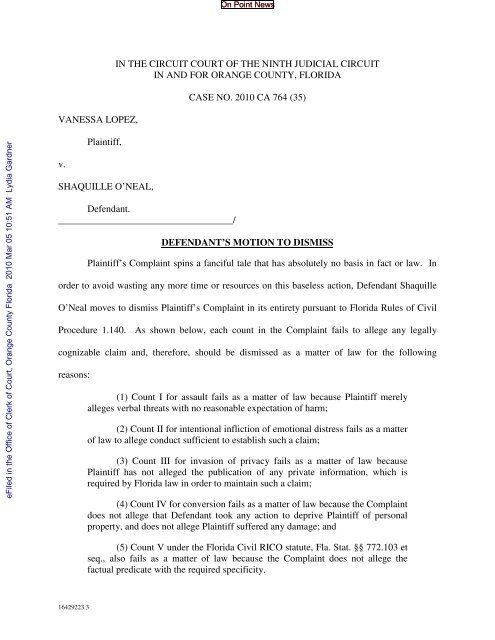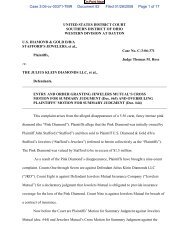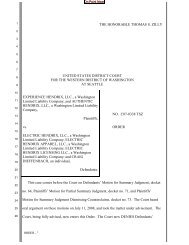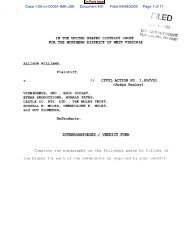Defendant's motion to dismiss - On Point News
Defendant's motion to dismiss - On Point News
Defendant's motion to dismiss - On Point News
Create successful ePaper yourself
Turn your PDF publications into a flip-book with our unique Google optimized e-Paper software.
<strong>On</strong> <strong>Point</strong> <strong>News</strong><br />
VANESSA LOPEZ,<br />
IN THE CIRCUIT COURT OF THE NINTH JUDICIAL CIRCUIT<br />
IN AND FOR ORANGE COUNTY, FLORIDA<br />
CASE NO. 2010 CA 764 (35)<br />
eFiled in the Office of Clerk of Court, Orange County Florida 2010 Mar 05 10:51 AM Lydia Gardner<br />
v.<br />
Plaintiff,<br />
SHAQUILLE O’NEAL,<br />
Defendant.<br />
____________________________________/<br />
DEFENDANT’S MOTION TO DISMISS<br />
Plaintiff’s Complaint spins a fanciful tale that has absolutely no basis in fact or law. In<br />
order <strong>to</strong> avoid wasting any more time or resources on this baseless action, Defendant Shaquille<br />
O’Neal moves <strong>to</strong> <strong>dismiss</strong> Plaintiff’s Complaint in its entirety pursuant <strong>to</strong> Florida Rules of Civil<br />
Procedure 1.140. As shown below, each count in the Complaint fails <strong>to</strong> allege any legally<br />
cognizable claim and, therefore, should be <strong>dismiss</strong>ed as a matter of law for the following<br />
reasons:<br />
(1) Count I for assault fails as a matter of law because Plaintiff merely<br />
alleges verbal threats with no reasonable expectation of harm;<br />
(2) Count II for intentional infliction of e<strong>motion</strong>al distress fails as a matter<br />
of law <strong>to</strong> allege conduct sufficient <strong>to</strong> establish such a claim;<br />
(3) Count III for invasion of privacy fails as a matter of law because<br />
Plaintiff has not alleged the publication of any private information, which is<br />
required by Florida law in order <strong>to</strong> maintain such a claim;<br />
(4) Count IV for conversion fails as a matter of law because the Complaint<br />
does not allege that Defendant <strong>to</strong>ok any action <strong>to</strong> deprive Plaintiff of personal<br />
property, and does not allege Plaintiff suffered any damage; and<br />
(5) Count V under the Florida Civil RICO statute, Fla. Stat. §§ 772.103 et<br />
seq., also fails as a matter of law because the Complaint does not allege the<br />
factual predicate with the required specificity.<br />
16429223.3
<strong>On</strong> <strong>Point</strong> <strong>News</strong><br />
Accordingly, Defendant respectfully requests that the Court <strong>dismiss</strong> Plaintiff’s Complaint with<br />
prejudice.<br />
BACKGROUND<br />
Plaintiff Vanessa Lopez (“Lopez”) has sued Defendant alleging claims for (1) assault, (2)<br />
intentional infliction of e<strong>motion</strong>al distress, (3) invasion of privacy, (4) conversion and (5) Florida<br />
Civil RICO. The central focus of the Complaint is Plaintiff’s assertion that she was involved in a<br />
relationship with Defendant that terminated. Compl. at 5. Thereafter, Plaintiff alleges that she<br />
was contacted by O’Neal or third parties on a number of occasions. She also alleges that O’Neal<br />
improperly interfered with her cell phone and email accounts. 28, 29, 36, 39 – 44, 47, 48 &<br />
50.<br />
DISCUSSION<br />
Based on these allegations, all Plaintiff’s claims fail as a matter of law.<br />
I. PLAINTIFF’S CLAIM FOR ASSUALT FAILS AS A MATTER OF LAW.<br />
An assault is an intentional, unlawful offer of corporeal injury <strong>to</strong> another by force, or<br />
force unlawfully directed <strong>to</strong>ward the person of another, under such circumstances as <strong>to</strong> create a<br />
well-founded fear of imminent peril, coupled with the apparent present ability <strong>to</strong> effectuate the<br />
attempt if not prevented. Colony Ins. Co. v. Barnes, 410 F. Supp. 2d 1137, 1141 (N.D. Fla.<br />
2005) (citing Winn and Lovett Grocery Co. v. Archer, 126 Fla. 308, 314, 171 So. 214, 217<br />
(1936)); Lay v. Kremer, 411 So. 2d 1347 (Fla. 1st DCA 1982). “A mere threat that is not<br />
followed by any attack, or attempt <strong>to</strong> attack, is not an assault.” FLJUR ASSAULT § 2 (citing<br />
Gelhaus v. Eastern Air Lines, 194 F.2d 774 (5th Cir. 1952)). Under Florida law, “mere words do<br />
not constitute an assault.” Lay, 411 So. 2d at 1349.<br />
Claims for assault fail as a matter of law where there is no allegation or evidence of a<br />
well-founded fear of imminent harm or the apparent present ability <strong>to</strong> effectuate the attempt if<br />
16429223.3<br />
2
<strong>On</strong> <strong>Point</strong> <strong>News</strong><br />
not prevented. For example, in Boschetti v. Landon, 660 So. 2d 365, 366 (Fla. 3d DCA 1995),<br />
the court held that a claim for assault failed as a matter of law because the plaintiff could not<br />
have had a reasonable apprehension of imminent harm where the threats made by the defendant<br />
were conditional and the defendant did not have any weapon on his person or display any<br />
weapon <strong>to</strong> the plaintiff. Id. (citing Newman v. Gehl Corp., 731 F. Supp. 1048, 1051 (M.D. Fla.<br />
1990); see also See Perez v. Siegel, 857 So. 2d 353, 354-55 (Fla. 3d DCA 2003) (explaining that<br />
verbal threats without an overt act creating a well-founded fear that violence was imminent were<br />
insufficient <strong>to</strong> qualify as assault); Bell v. Anderson, 414 So. 2d 350 (Fla. 1st DCA 1982) (finding<br />
allegation of verbal threat made form 30 <strong>to</strong> 40 feet away was insufficient <strong>to</strong> establish assault).<br />
In this case, Plaintiff’s claim fails as a matter of law because she does not allege<br />
Defendant made any threats. To the extent Plaintiff attempts <strong>to</strong> impute the conduct of others <strong>to</strong><br />
Defendant her claim fails because she has not alleged a conspiracy or apparent agency.<br />
Furthermore, the Complaint merely alleges oral threats and provides no facts establishing that<br />
she had a well-founded fear of imminent peril, coupled with the apparent present ability <strong>to</strong><br />
effectuate the attempt if not prevented. Plaintiff does not allege facts indicating that any of the<br />
individuals she claims made such threats had the apparent ability <strong>to</strong> act imminently.<br />
Accordingly, Plaintiff’s claim for assault fails as a matter of law.<br />
II.<br />
PLAINTIFF FAILS TO ALLEGE CONDUCT SUFFCIENT TO ESTABLISH<br />
INTENTIONAL INFLICTION OF EMOTIONAL DISTRESS AS A MATTER OF<br />
LAW.<br />
Plaintiff failed <strong>to</strong> state a claim for intentional infliction of e<strong>motion</strong>al distress since she has<br />
not and cannot allege conduct that is outrageous as a matter of law. In order <strong>to</strong> bring a claim for<br />
intentional infliction of e<strong>motion</strong> distress, Plaintiffs must allege that (1) Defendant’s conduct was<br />
intentional or reckless; (2) Defendant’s conduct was outrageous; (3) Defendant’s conduct caused<br />
e<strong>motion</strong>al distress; and (4) Plaintiff suffered severe e<strong>motion</strong>al distress. Metropolitan Life Ins.<br />
16429223.3<br />
3
<strong>On</strong> <strong>Point</strong> <strong>News</strong><br />
Co. v. McCarson, 467 So. 2d 277 (Fla. 1985). To allege a claim the conduct must be “so<br />
outrageous in character and extreme in degree as <strong>to</strong> exceed all possible bounds of decency and <strong>to</strong><br />
be regarded as atrocious and utterly in<strong>to</strong>lerable in a civilized community.” House of God Which<br />
is the Church of the Living God, the Pillar and Ground of the Truth Without Controversy, Inc. v.<br />
White, 792 So. 2d 491, 493 (Fla. 4th DCA 2001) (internal citations omitted). The Court may<br />
<strong>dismiss</strong> a complaint that fails <strong>to</strong> allege conduct rising <strong>to</strong> this level as a matter of law. Ward v.<br />
Fla. Bd. Of Educ., 822 So. 2d 518 (Fla. 1st DCA 2002) (<strong>dismiss</strong>ing with prejudice a claim for<br />
intentional infliction of distress based on that allegations that a university erroneously<br />
represented the availability of a specific degree program).<br />
For example, in Kent v. Harrison, 467 So. 2d 1114, 1114 (Fla. 2d DCA 1983), the court<br />
found that evidence of “a campaign of telephonic harassment” was insufficient <strong>to</strong> establish<br />
intentional infliction of e<strong>motion</strong>al distress as a matter of law. In addition, Florida courts have<br />
been reluctant <strong>to</strong> find claims for intentional infliction of e<strong>motion</strong>al distress based on allegations<br />
of oral abuse. Pon<strong>to</strong>n v. Scarfone, 468 So. 2d 1009 (Fla. 2d DCA 1985) (statements made <strong>to</strong><br />
induce employee <strong>to</strong> join sexual liaison did not establish intentional infliction of e<strong>motion</strong>al<br />
distress); Lay v. Roux Labs., Inc., 379 So. 2d 451 (Fla. 1st DCA 1980) (threatening plaintiff with<br />
job, using humiliating language, vicious verbal attacks and racial epithets deemed insufficient <strong>to</strong><br />
serve as predicate for claim of intentional infliction of e<strong>motion</strong>al distress). The allegations here<br />
similarly fail <strong>to</strong> establish intentional infliction of e<strong>motion</strong>al distress as a matter of law.<br />
III.<br />
PLAINTIFF’S CLAIM FOR INVASION OF PRIVACY FAILS BECAUSE SHE<br />
DOES NOT ALLEGE ANY PRIVATE INFORMATION WAS DISCLOSED TO<br />
THE PUBLIC.<br />
Plaintiff’s claim for invasion of privacy fails as a matter of law because she does not<br />
allege that any private information was published <strong>to</strong> the public.<br />
16429223.3<br />
4
<strong>On</strong> <strong>Point</strong> <strong>News</strong><br />
Florida decisions have recognized a <strong>to</strong>rt of invasion of privacy including: (1) Intrusion,<br />
i.e., invading plaintiffs’ physical solitude or seclusion; (2) Public Disclosure of Private Facts; (3)<br />
False Light in the Public Eye, i.e., a privacy theory analogous <strong>to</strong> the law of defamation; and (4)<br />
Appropriation, i.e., commercial exploitation of the property value of one’s name. Allstate<br />
Insurance Co. v. Ginsberg, 863 So. 2d 156, 162 (Fla. 2003) (citing Cason v. Baskin, 155 Fla.<br />
198, 20 So. 2d 243 (1944)). Each type of invasion requires an element of publication <strong>to</strong> the<br />
public at large. Rivers v. Dillards Dep’t S<strong>to</strong>re, Inc., 698 So. 2d 1328, 1331 (Fla. 1st DCA 1997)<br />
(granting summary judgment on claim for invasion of privacy and intrusion where there was “no<br />
evidence of publication of any facts <strong>to</strong> the public at large”); Pon<strong>to</strong>n v. Scarfone, 468 So. 2d 1009<br />
(Fla. 2d DCA 1985) (employer’s utterances designed <strong>to</strong> induce employee in<strong>to</strong> sexual liaison are<br />
insufficient <strong>to</strong> come within zone of conduct constituting unlawful invasion of employees right of<br />
privacy), review denied, 478 So. 2d 54 (Fla.1985); Steele v. Offshore Shipbuilding, Inc., 867 F.2d<br />
1311 (11th Cir.1989) (employee’s invasion of privacy action against employer fails because<br />
employee did not prove publication of suggestive comments); Sacco v. Eagle Fin. Corp. of North<br />
Miami Beach, 234 So. 2d 406, 408 (Fla. 3d DCA 1970) (requiring evidence of publication). The<br />
Florida Supreme Court has rejected lower court opinions suggesting that a plaintiff can bring a<br />
claim for invasion of privacy where there is no publication. Allstate, 863 So. 2d at 162.<br />
For example, in Allstate the Florida Supreme Court concluded that the <strong>to</strong>rt of invasion of<br />
privacy including “(2) intrusion-physically or electronically intruding in<strong>to</strong> one’s private<br />
quarters,” is not broad enough <strong>to</strong> include unwelcome conduct including <strong>to</strong>uching someone in a<br />
sexual manner and making sexually offensive comments. Id. The Supreme Court concluded that<br />
“[t]he intrusion <strong>to</strong> which this refers is in<strong>to</strong> a ‘place’ in which there is a reasonable expectation of<br />
privacy and is not referring <strong>to</strong> a body part. As we noted at the time we first recognized this <strong>to</strong>rt in<br />
16429223.3<br />
5
<strong>On</strong> <strong>Point</strong> <strong>News</strong><br />
Cason, the <strong>to</strong>rt of invasion of privacy was not intended <strong>to</strong> be duplicative of some other <strong>to</strong>rt.<br />
Rather, this is a <strong>to</strong>rt in which the focus is the right of a private person <strong>to</strong> be free from public<br />
gaze.” Id. (emphasis added). Here, as in Allstate, there is no allegation that any private<br />
information was published <strong>to</strong> the public. Accordingly, Plaintiff’s claim for invasion of privacy<br />
fails as a matter of law.<br />
IV.<br />
PLAINTIFF’S CLAIM FOR CONVERSION FAILS AS A MATTER OF LAW.<br />
It is well settled that a conversion is an unauthorized act which deprives another of his<br />
property permanently or for an indefinite time. Mayo v. Allen, 973 So. 2d 1257, 1258-59 (Fla.<br />
1st DCA 2008) (citing Star Fruit Co. v. Eagle Lake Growers, Inc., 33 So. 2d 858 (1948);<br />
General. Fin. Corp. of Jacksonville v. Sex<strong>to</strong>n, 155 So. 2d 159 (Fla. 1st DCA 1963)). Conversion<br />
may be demonstrated by a plaintiff’s demand and a defendant’s refusal. See Goodrich v.<br />
Malowney, 157 So. 2d 829, 832 (Fla. 2d DCA 1963) (“The purpose of proving a demand for<br />
property by a plaintiff and a refusal by a defendant <strong>to</strong> return it in an action for conversion is <strong>to</strong><br />
show the conversion. The generally accepted rule is that demand and refusal are unnecessary<br />
where the act complained of amounts <strong>to</strong> a conversion regardless of whether a demand is made.”).<br />
Here, the Complaint does not allege any unauthorized conduct of Defendant that deprived<br />
Plaintiff of any property. Defendant’s alleged conduct in accessing voicemail and text messages<br />
on her telephone and deleting text messages is insufficient as a matter of law. First, voicemail<br />
messages and text messages are not personal property capable of conversion. Teleco, Inc. v.<br />
Southwestern Bell Telephone Co., 392 F. Supp. 692, 697 (D.C. Okl. 1974) (holding that “[t]he<br />
right <strong>to</strong> telephone service is not personalty or personal property which is capable of being<br />
converted”); see also Express <strong>On</strong>e International, Inc. v. Steinbeck, 53 SW.3d 895, 900-01 (Tx.<br />
Ct. App. 2001) (holding that using a screen name <strong>to</strong> impersonate someone on the internet fails <strong>to</strong><br />
establish conversion as a matter of law because a screen name is not personal property). Second,<br />
16429223.3<br />
6
<strong>On</strong> <strong>Point</strong> <strong>News</strong><br />
even if they were personal property, allegedly accessing voicemail messages and text messages<br />
would not deprive Plaintiff of any property interest. Nor has she alleged any damages as a result<br />
of any alleged deletion of her text messages. As such, Plaintiff’s claim for conversion fails as a<br />
matter of law.<br />
III.<br />
PLAINTIFF’S CLAIM UNDER FLA. STAT. §§ 772.103 ET SEQ. SHOULD BE<br />
DISMISSED BECAUSE IT IS NOT PLEAD WITH PARTICULARITY.<br />
A Plaintiff asserting Florida RICO claims pursuant <strong>to</strong> Fla. Stat. §§ 772.103 et seq. must<br />
plead, among other things: 1) the conduct; 2) of an enterprise; 3) through a pattern; 4) of<br />
racketeering activity. Elliott v. Foufas, 867 F.2d 877, 880 (5th Cir. 1989) 1 (citing Sedima,<br />
S.P.R.L. v. Imrex Co., 473 U.S. 479, (1985)). In addition <strong>to</strong> those elements, a RICO conspiracy<br />
claim requires the Plaintiff <strong>to</strong> allege with specificity how the Defendant conspired <strong>to</strong> violate one<br />
of the RICO substantive provisions. See Salinas v. United States, 522 U.S. 52 (1997). The<br />
Florida RICO claims here should be <strong>dismiss</strong>ed because none of these elements are adequately<br />
pled.<br />
A RICO Plaintiff must allege specific facts establishing the existence of an “enterprise.”<br />
See United States v. Turkette, 452 U.S. 576 (1981). To plead a viable RICO enterprise, the<br />
plaintiff must allege: (1) “an ongoing organization, formal or informal;” (2) that “the various<br />
associates function as a continuing unit;” and (3) “an entity separate and apart from the pattern of<br />
activity in which it engages.” Id., at 583. A RICO plaintiff must plead specific facts, not mere<br />
conclusions, which establish the existence of an enterprise. Elliot v. Foufas, 867 F.2d 877, 881<br />
(5th Cir. 1989); Gellert v. Richardson, 1996 WL 107550 at *4 (M.D. Fla. Jan. 26, 1996)<br />
1 The Florida RICO statute was patterned after the Federal RICO statute, and Florida courts routinely look <strong>to</strong><br />
Federal RICO decisions as persuasive authority in interpreting Florida’s RICO statute. See Jackson v. BellSouth<br />
Telecommunications, 372 F.3d 1250, 1263-64 (11th Cir. 2004); Florida Evergreen Foliage v. E.I. Dupont De<br />
Nemours and Co., 336 F. Supp. 2d 1239 (S.D. Fla. 2004); Bortell v. White Mountains Ins. Group, Ltd., 2 So. 3d<br />
1041, 1046-47 (Fla. 4th DCA 2009).<br />
16429223.3<br />
7
<strong>On</strong> <strong>Point</strong> <strong>News</strong><br />
(“Besides lumping these Defendants <strong>to</strong>gether and using the terms conspiracy and enterprise,<br />
Plaintiff has not indicated how these Defendants form an enterprise”) aff’d, 124 F.3d 1329 (11th<br />
Cir. 1997) (table). The Complaint here does not advance any enterprise theory whatsoever.<br />
Moreover, Plaintiff has not alleged that she suffered any actual injuries. To establish<br />
standing, a Plaintiff must also allege that the RICO violation was both: (a) a “but for” cause of<br />
the injury, and (b) the direct and proximate cause of the injury. See Holmes v. Securities Inves<strong>to</strong>r<br />
Protection Corp., 503 U.S. 258, 265-70 (1992). Plaintiff has not shown that she has been injured<br />
by any actionable conduct of Defendant, and she cannot meet the “but for” or “proximate cause”<br />
tests. For the same reasons, Plaintiff’s RICO conspiracy claims also fail. See Grider v. Texas<br />
Oil & Gas Corp., 868 F.2d 1147, 1150 (10th Cir. 1989) (“Because [plaintiff] has not alleged<br />
injury from the substantive violations, he has failed <strong>to</strong> show how the alleged conspiracy <strong>to</strong><br />
commit those violations caused him injury”).<br />
WHEREFORE, Defendant respectfully requests that this Court <strong>dismiss</strong> Plaintiff’s<br />
Complaint with prejudice and award Defendant his at<strong>to</strong>rney’s fees and costs pursuant <strong>to</strong> Fla.<br />
Stat. § 772.104(3).<br />
Dated: March 5, 2010<br />
Respectfully submitted,<br />
s/Benjamine Reid<br />
Benjamine Reid, Esq.<br />
Florida Bar No. 183522<br />
E-mail:breid@carl<strong>to</strong>nfields.com<br />
CARLTON FIELDS, P.A.<br />
100 SE Second Street, Suite 4000<br />
Miami, Florida 33131<br />
Telephone: (305) 530-0050<br />
Facsimile: (305) 530-0055<br />
16429223.3<br />
8
<strong>On</strong> <strong>Point</strong> <strong>News</strong><br />
Charles Cacciabeve, Esq.<br />
Florida Bar No. 329908<br />
E-mail: ccacciabeve@carl<strong>to</strong>nfields.com<br />
CARLTON FIELDS, P.A.<br />
CNL Center at City commons<br />
450 South Orange Avenue, Suite 500<br />
Orlando, FL 32801<br />
Telephone: (407) 849-0300<br />
Facsimile: (407) 849-9191<br />
CERTIFICATE OF SERVICE<br />
I HEREBY CERTIFY that on this 5 th day of March, 2010, I electronically filed the<br />
foregoing document with the Clerk of the Court using CM/ECF, which will send notification of<br />
such filing <strong>to</strong> Counsel for Plaintiffs: Hal K. Litchford, Esq., Litchford & Chris<strong>to</strong>pher, P.A.,<br />
390 North Orange Avenue, P.O. Box 1549, Orlando, Florida 32802; Deborah S. Chames, Esq.,<br />
Heller and Chames, P.A., 261 Northeast First Street, 6 th floor, Miami, Florida 33132; and<br />
Gloria Allred, Esq., Allred, Maroko & Goldberg, 6300 Wilshire Boulevard, Suite #1500, Los<br />
Angeles, California 90048. I further certify that I mailed the foregoing document and the notice<br />
of electronic filing by first-class mail <strong>to</strong> each of the foregoing counsel.<br />
s/Benjamine Reid<br />
BENJAMINE REID<br />
16429223.3<br />
9
















